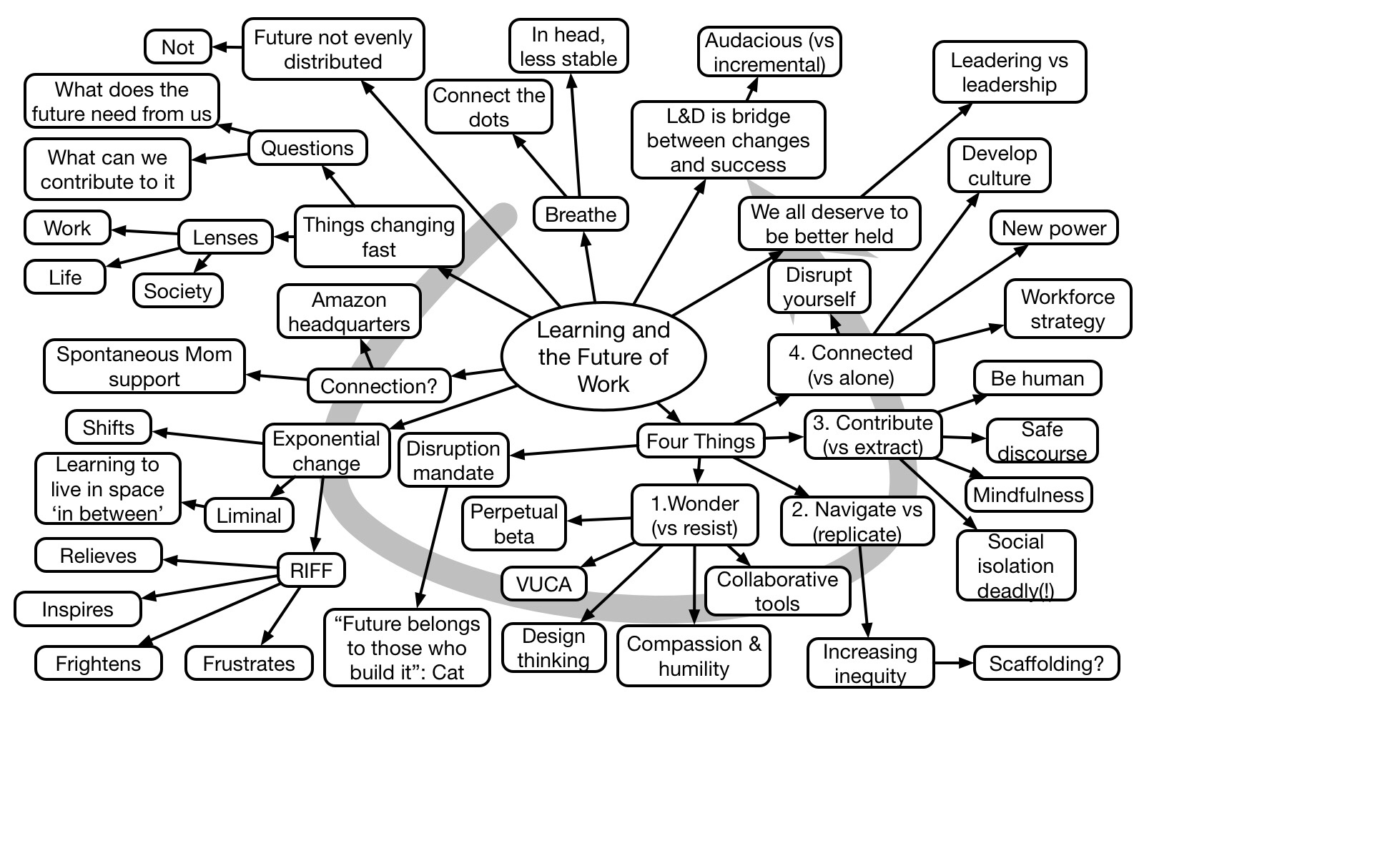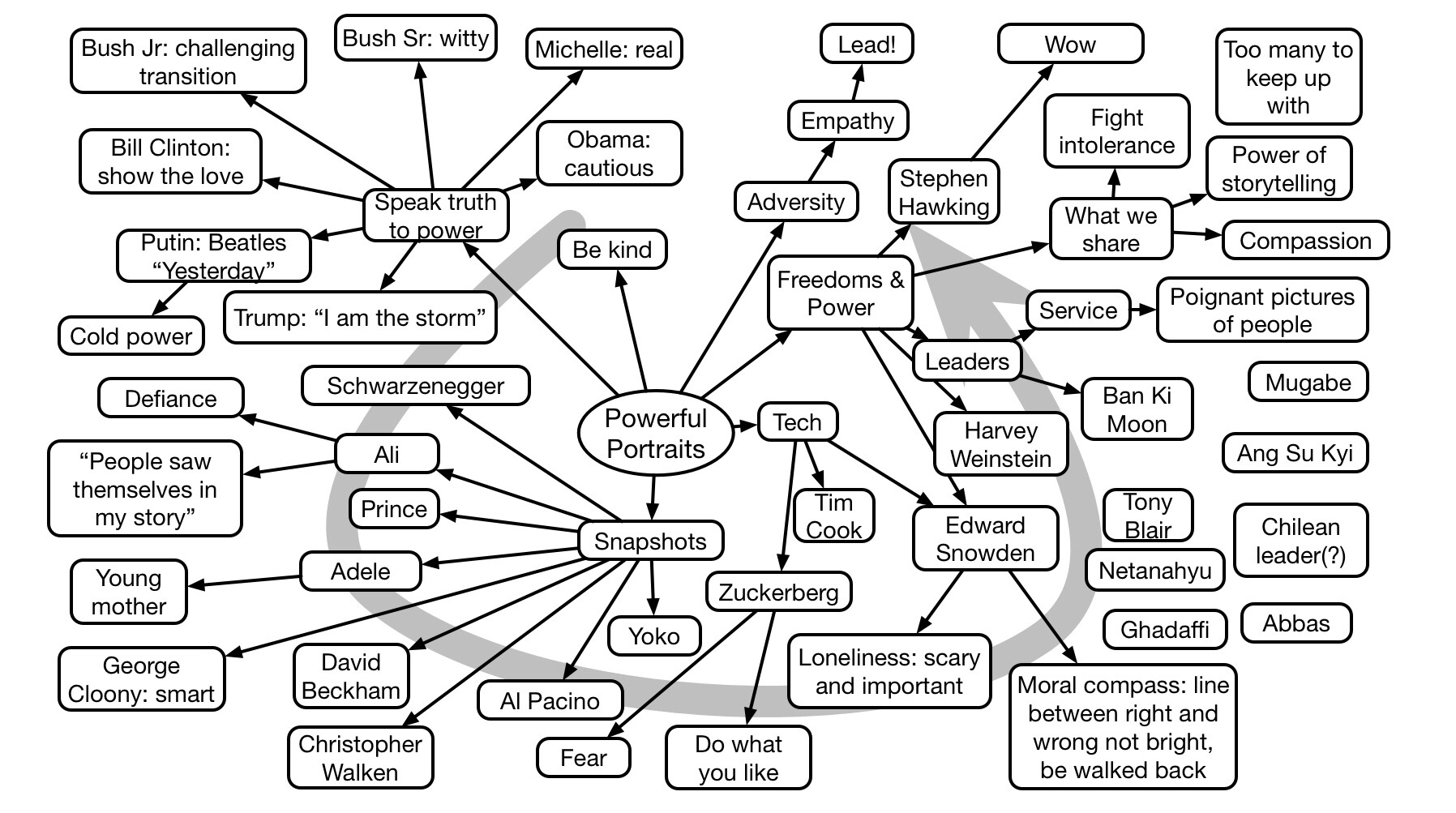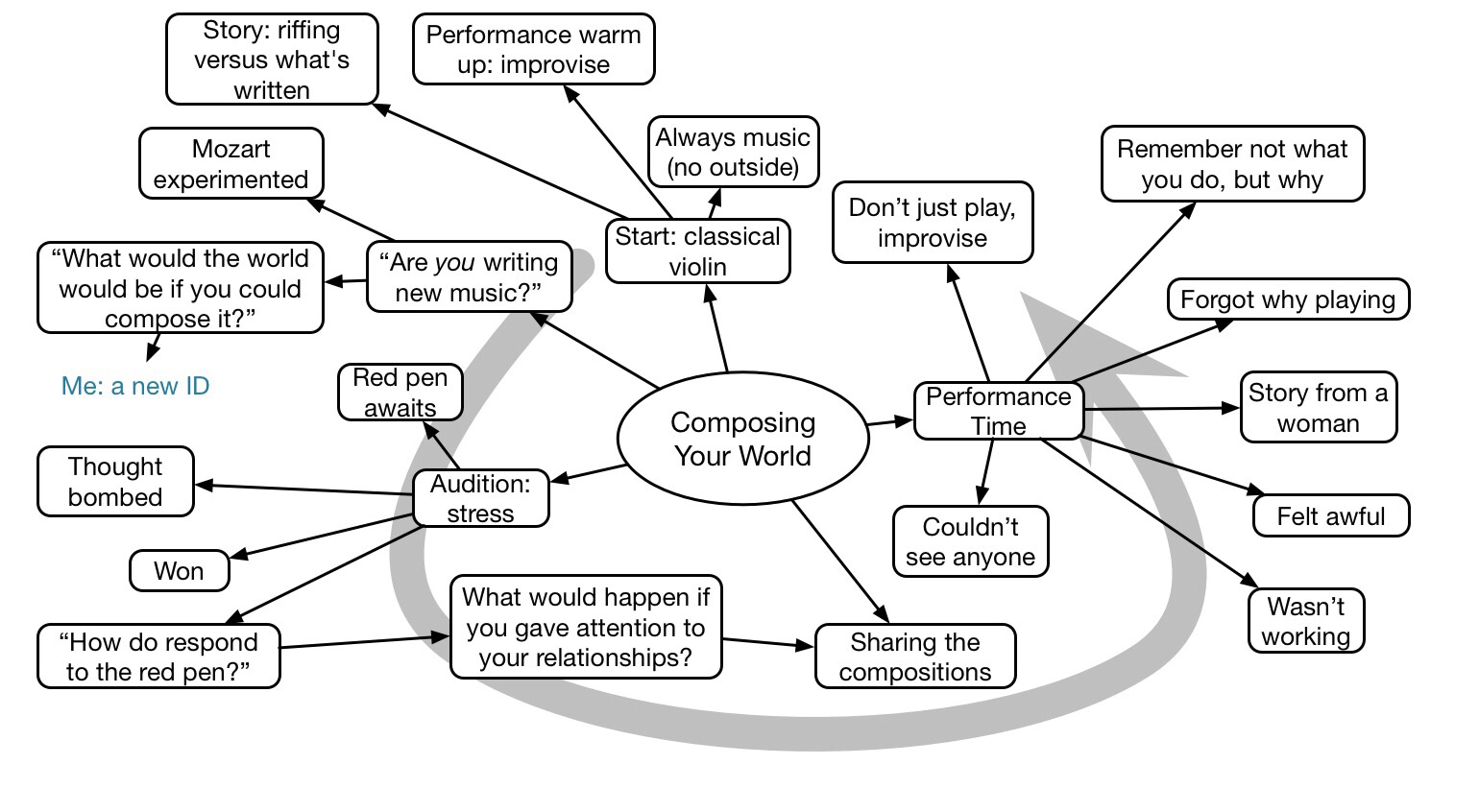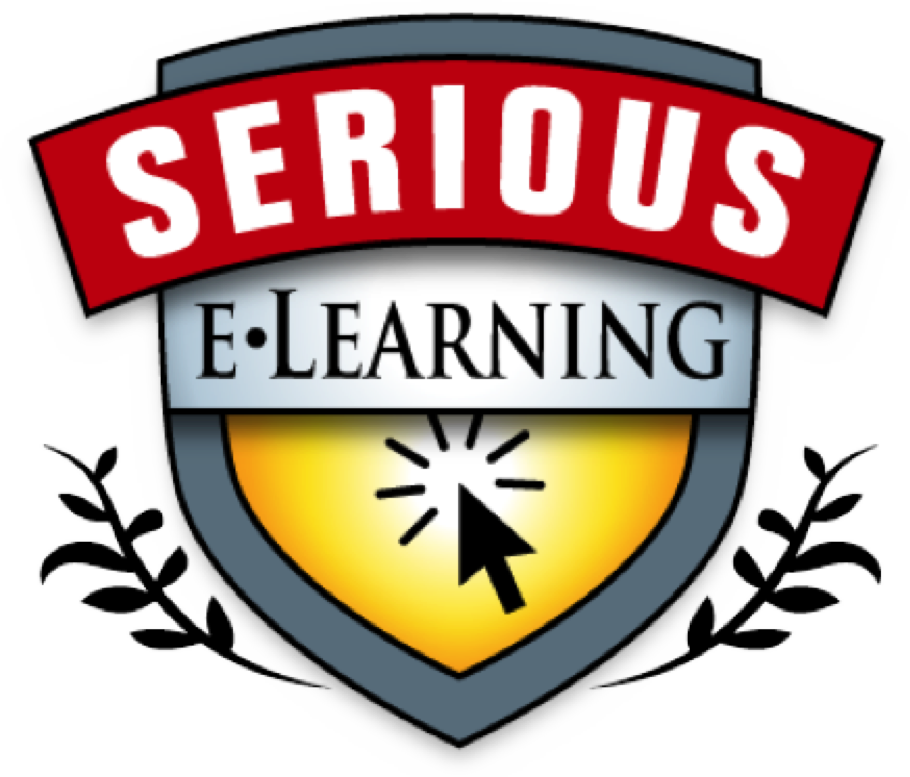Nancy Giordano was the closing keynote for the Guild’s always excellent Learning Solutions conference. In a rapid (!) talk, she gave a different cut through the changes we are facing and strategies for coping. Thought-provoking!

Clark Quinn’s Learnings about Learning
Nancy Giordano was the closing keynote for the Guild’s always excellent Learning Solutions conference. In a rapid (!) talk, she gave a different cut through the changes we are facing and strategies for coping. Thought-provoking!

Platon, a portrait photographer extraordinaire, gave a poignant presentation about leadership. Starting with some presidential anecdotes, he weaved in celebrities on the way to world leaders. He ended with a powerful message about doing right and wrong and how leaders can tap into empathy to do the best for the people they represent.

Kai told stories about his experiences in music and used them to draw lessons for us. He inspired us to connect to our purpose and experiment, and demonstrated what he meant through playing.

by Clark 5 Comments
I’ll be giving an upcoming webinar where I make my case for defining microlearning. And, as part of my usual wrestling with clarity, I created a diagram. I thought I’d share it with you.
What, you want me to walk you through it? :)
Microlearning is a portmanteau (technical term: mashup) of micro and learning. Thus, it implies small bits of learning. Here I’m mapping it out in several ways. I’ve previously argued that there are three main ways, but let’s map the first two out. It’s either
And there are problems with both. Too often, folks talk about breaking an existing course down into small chunks, and I suggest that won’t work without some significant (!) effort. Just breaking it up means something seen earlier can be forgotten, so you need to worry about knowledge atrophy and plan reactivation. And that’s just spaced learning!
And I think it’s unlikely that you can have a single object lead to any meaningful learning. However, such an object can serve as support to succeed in the moment. How-to videos, job aids, and the like all can be used to achieve an outcome. And that’s just performance support!
What I think is the real untapped opportunity that could (and I say should) capture the moniker would be contextualized learning. Layering on a bit of learning because of when and where you are that develops you over time. It’s combining the two, potentially, so you help someone in the moment but add in the bit that also makes it a learning experience. There’s much more to this, but that’s the core idea.
My main issue here is that people are fast and loose with the term microlearning, and I’d like to make sure people are either talking about spaced learning or performance support (both good). And not talking about just breaking up a course into chunks that are nice to consume but not engineered to lead to retention and transfer (not so good). Of course, better yet if we converge on contextualized learning!
In the early days of the internet, I had a chance to read one of the early translations of The Japan That Can Say No. The point I took away was the critique of short-term decision making driven by the need for shareholder returns. I was pondering this the other day, as I wondered how organizations can look to make longer-term investments. And it led me to ponder the question of what the return is on wisdom.
So, the book was a sensation. At the time, the rumor was that it was written by two top Japanese. It wasn’t released in English, but instead was illicitly translated because of the scandalous claims. Still, I thought the assessment of the problems with derivative financing and efficiency approaches were apt. Are these approaches wise?
I use the term wisdom because I think we can, and need to, go beyond ‘smart’. I was pursuing my own quest to transcend what I do, and came upon a nice view of wisdom from Sternberg. This one argues that we should make decisions with both short- and long-term views, for not just us and ours, but for all people, with an explicit consideration of the value that we are following. Ok, so I’m a native Californian, but I don’t see a problem with this view. Smart is ‘in the moment’, wise is looking at the bigger picture.
I ponder this in the context of organizations continually looking to reduce costs through expediency. As an alternative, they could be looking at longer term approaches that help them get their workforce more intrinsically engaged. Does outsourcing and layoffs end up being more costly than investing in better leadership and culture?
There are some answers. Laurie Bassie’s research found that there was a correlation between high scores on handling people and business results. Similarly, Towards Maturity finds that companies with good L&D practices are more likely to be successful. It’s not surprising. When you provide meaningful work with enablement to succeed, you’re aligning the elements to succeed. It’s a path to a coherent organization. And, like with light, it’s more powerful.
There are arguments to move in wise directions. It may be hard if you’re driven by the need to produce short-term returns. Still, it’s the wise thing to do.
Ok, so this may be small news, but it’s still news (and I, at least, am excited!). I’ve previously mentioned my forthcoming book: Millennials, Goldfish, and other Training Misconceptions: Debunking Learning Myths and Superstitions. It’s not out yet, though you can preorder. What I’m excited about is that I’ve now put up the site for the book.
OK, whoop de doo. I get it, yet another site. Still, it’s exciting for me for several reasons:
And, I kind of like the URL I was able to grab: debunkinglearningmyths.com.
So, I don’t expect you to get as excited as me, but I did feel I should at least let you know.
So this just appeared in my email this morning. Can you tell what’s wrong?
“The next generation of L&D is here. Millennials are quickly becoming the majority of the world’s workforce. They will need training to become successful leaders. But, because they’ve grown up with mobile devices and digital technologies, they learn differently than previous generations. A solid understanding of millennial learning styles will help you create effective training programs.”

Yep, snake oil. We’ve hit the myth jackpot! How many can you spot? This is the type of stuff marketers come up with that you can’t fight if you don’t know our brains (and more). So let’s take it apart, shall we? (This is so much fun!)
First, ‘next gen of L&D‘. Um, maybe. I don’t see things being done all that differently. It’s more evolution than revolution (despite my exhortations to the latter ;). Still, no real myth yet.
Next, ‘millennials‘. And, yes, we have a winner! The evidence says that there’re no meaningful differences between generations. And if you think about it, it’s much more a continuum than discrete separations. It may be convenient, but it undermines people’s individuality. It’s really a mild form of age discrimination, dealing with people by the year they’re born instead of their unique circumstances. So, we’ve got our first myth. How much would you pay for this? But wait, there’s more!
Need ‘leadership training’? Er, yeah, so does pretty much everyone. Some folks may get there naturally, but that’s not the way to bet. Moving on…
‘Learn differently’ because of growing up digital. This is the ‘digital natives’ story and the ‘digital learning’ story. And both have been debunked. Turns out that folks who’ve grown up with digital technology aren’t necessarily any better at it. They don’t do better searches, for instance. They may be more comfortable, but that’s not what the claim is. Again, this is sort of discrimination, categorizing people by their environment rather than their individual capability.
And, there’s the story that we’re now learning in fundamentally new ways. Er, not. Our brains haven’t evolved that fast. We still need sustained and varied retrieval practice and feedback. No ‘knowledge downloads’ yet. So here we have two, two, two myths in one! (Throwback: who recognizes the reference?) Keeping count? We’re up to three. Now how much would you pay? But wait, there’s still more!
‘Learning styles’. Ow! The zombie that won’t die; kill it, kill it! Back to the evidence: there’s no meaningful and reliable instrument to measure styles, so you couldn’t identify them. And there’s no evidence that adapting to them helps either (which is implicit). So really, this is two more myths! Wow, 5 myths in one paragraph. You’d be hard pressed to do better on purpose!
 I worry who might fall prey to this marketing campaign. I hate to tell you this, but there’s no there there. You’d be far better off putting your effort in improving your learning design than buying into this misguided and misleading effort. If you want help with that, let me know (that’s what I do!), and there are plenty of resources (c.f. the Serious eLearning Manifesto).
I worry who might fall prey to this marketing campaign. I hate to tell you this, but there’s no there there. You’d be far better off putting your effort in improving your learning design than buying into this misguided and misleading effort. If you want help with that, let me know (that’s what I do!), and there are plenty of resources (c.f. the Serious eLearning Manifesto).
Folks, my book on myths is coming out at the end of April. You can be prepared to defend yourself for the cost of just a few coffees. And, you can pre-order it now. Our industry needs to get onto a proper basis. This is one small step, but one that needs to be taken.
A couple of weeks ago, I posited what I thought might make the basis for a sustainable degree program. That is, one that prepares students for a world with increasing change. In it I talked about the domains that I thought would provide a solid basis, but I did not talk about something else important. It’s also about the learning to learn and work skills that accompany the foundational knowledge. It’s about ‘meta’ skills.
Meta-skills, like learning to learn and learning to work well (21C skills), can’t be developed on their own. They need to be layered on top of other things. We teach them across other domains, so they’re abstracted and can be reapplied to new problems and situations. Thus, these challenges must reappear across the curriculum.
What skills? I think things like the ability to research questions, design and run experiments, communicate results, collaborate, ask and answer questions in ways that work, and more. This includes using technology for these tasks, as well as working with others. Thus, creating spreadsheets, diagrams, and presentations is as much a part as is participating in and leading projects, commenting constructively, and coaching and mentoring.
So, using an application-based pedagogy, there are a series of activities that require application, but they vary in type: research, design, problem-solve, interact, and in output. Then we evaluate those cross-discipline skills as well as the domain knowledge and skills. How was your research process on this interface design project? How well did you communicate your learnings from that experiment on recursion in learning programs?
Curriculum and the pedagogy can be refined, and in fact are interleaved. Then we use technology to serve both as a tool for learners to construct (make) outcomes, and to track their progress. We need to go meta in both!
And this isn’t true just for formal education, and can and should play a role in organizational learning as well. We shouldn’t take our learners’ learning skills for granted, and we can and should track and develop them as well. This isn’t currently supported, but perhaps can be in existing tools, or we may need a new platform. But we should, I suggest. Your thoughts?
by Clark 3 Comments
I’m a fan of Michael Allen’s, not only because he knows his stuff and he’s a very good person, but also because he has a knack for making things accessible. For example, his Guide to eLearning is as good a guide to designing elearning as you can get (that and Julie Dirksen’s Design for How People Learn, both appropriately in their second edition). So when I thought to criticize one of his models, I had to think really hard! And I’m still wrestling with it, but I also realize I’d gone down the same path! Obviously, it’s time to explore the issue.
One of Michael’s models is the CCAF model for making meaningful elearning. That’s:
There are nuances about this, but it nicely incorporates some of the best principles about designing effective (and engaging) practice. If you put people in a context and ask them to act, you’re minimizing the distance between the practice and the actual performance. Which is, of course, key to successful transfer. So this is a very handy shorthand, like Cathy Moore’s Action Mapping.
Now, in many ways, this is similar to my own activity-based design, which is more a curricular model than a pedagogical one, but it foregrounds activity instead of content. The goal is to have learners do something! And, of course, I’m thinking of creating a work product in many instances, or making meaningful decisions.
So what was I concerned about? Perhaps because I’d been thinking (and whinging) about ‘click to see more’ interactions, I want those activities to mean something! You could have an activity that’s just ‘matching’, or ‘identify the right word’ type of knowledge test. Those are activities, just not cognitively challenging ones. And of course Michael emphasizes this in his descriptions, but…there’s an opportunity for people to be slack.
I wondered about using ‘application’ instead of activity, focusing on the fact that people should be applying the knowledge to do something, not just doing any sort of activity. Do the semantics matter enough to be worth considering? Application-based design? Context-Challenge-Application-Feedback? Perhaps not, but I thought I’d think ‘out loud’ as usual. (Both to reiterate the point as well as to solicit your input.) So, what are your thoughts? Worth it? Or too much ‘splitting angel’s hairs on the head of a pin’ (metaphors mixed while you wait)?